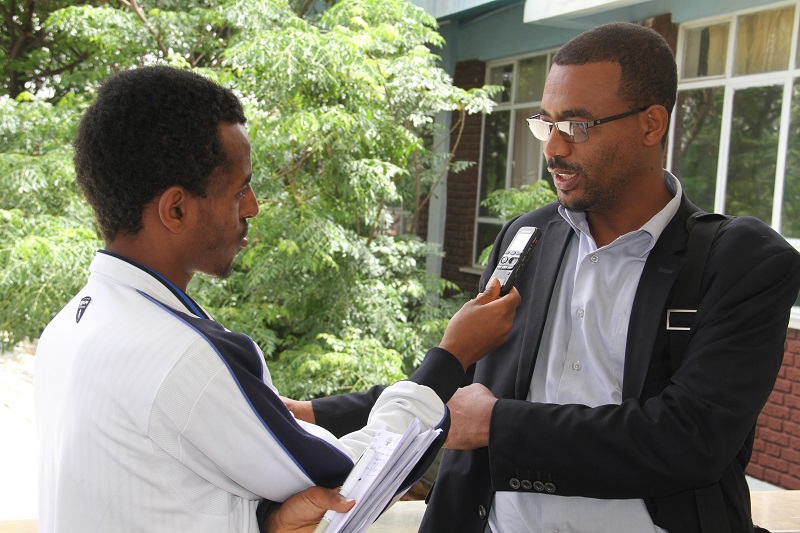Tewodros Kassa is a 27-year-old journalist from Ethiopia, currently a reporter with the Ethiopian Herald. A holder of a BA degree in journalism and communications, Tewodros chose health journalism as his specialty. In this article, he shares his experiences as a health reporter during the COVID-19 pandemic. Tewodros is also a member of the IPPF Africa Region SRHR Journalists’ Network.

Why did you choose to be a journalist?
I chose journalism because I wanted to positively contribute to society by sharing information through telling powerful stories. I observed that many people faced difficulties in life due to lack of proper information, especially that related to their health. I wanted to fill this gap by empowering them with information that would enable them to make healthy decisions about their lives.
Why did you choose to specialize in health journalism?
I particularly chose health journalism because good health is critical to our survival and well-being. However, there remains a wide information gap when it comes to health. While there are many important health issues to be covered, in Ethiopia, many media houses prioritize politics, business, and other agendas, with minimal space being given to health. My desire has always been to change this by advocating for more coverage of health issues and mobilizing policy makers and other stakeholders’ commitment towards a healthier society through well-told stories.
Where do you get your stories from?
I like reporting from a human-interest angle. This involves interviewing ordinary people in the field. Reporting this way helps my readers connect with the story better. Data and lengthy reports filled with jargon from scientists, researchers, medics and policymakers are best interpreted and told through the stories of individuals -the human-interest angle-, and that is what I do.
What is your daily routine like as a health journalist?
Every morning, I make sure I catch up with global and local news as I keep myself updated. I then try to develop story ideas based on the health issues of the day. I also finish any pending stories I was working on. I am constantly in touch with my sources –who include health care professionals, patients, researchers and scientists as they are the ones who give me new information and help verify facts in their areas of expertise.
Which is the most memorable story you have ever filed?
It has to be the story I did titled “The covert life of Eskedar”. This was the story of a 35-year-old woman living in rural Ethiopia, and whose education was interrupted when she was married off at the age of 10. She went on to face abuse in her marriage, which she eventually left. In her struggle for survival, she ended up on the streets as a commercial sex worker, where she faced a myriad of challenges including sexual violence, harassment and exposure to sexually transmitted infections (STIs) including HIV. Eskedar’s story inspired me to continue doing more reports that highlight issues of poverty, child marriage and the need for education of the girl child, as well as women’s empowerment.
What have some of your experiences been during COVID-19?
My reporting experience during Covid-19 has no doubt been challenging. Staying at home and working from home is difficult as a journalist, especially when your work largely requires you to go out to the field to collect information. Restrictions on movement have affected our regular group discussion forums, attending of conferences and other public forums -all of which are platforms for harvesting good story ideas.
However, conducting telephone interviews, use of social media and other digital technologies have allowed me to succeed in my reporting during the pandemic. Social media has been of great benefit to me when reporting during COVID-19. I have attended many press conferences, webinars, conducted interviews and followed live proceedings of reports and briefings via social media. Besides, social media is faster than the mainstream media when it comes to disseminating stories to the public.
I can also say that adhering to the stipulated COVID-19 safety mechanisms have helped me stay safe. I wear my face mask as required, washing hands properly, sanitize, stay home when it is necessary, and I observe social distancing while out there.
How have you worked with IPPF’s Member Association during this time?
Family Guidance Association of Ethiopia (FGAE) has over the years played a supportive role for me as a journalist – something it has continued to do during this time of COVID-19. As I’m collecting information, FGAE always helps me find the right person for the interview, generate new ideas, access experts for my story, access data and other resources, among others. FGAE has helped me over the years in my health reporting.
Tewodros spoke to Maryanne W. Waweru, Communications Officer, IPPF Africa Regional Office
The IPPF COVID-19 Taskforce is setting a new benchmark of collective decision making and actions to contribute to the vision of a Unified Secretariat. Its Microsite and Slack channel have been invaluable to share news throughout the Federation.
Please do continue to engage with each other and the Taskforce through them. In particular, the #innovation and #services Slack channels are a great place to share members experience and enable peer support where other members would like to replicate DHIs.
And you can stay up to date on the work of the Taskforce through the actions and decisions page here: Actions and decisions from the COVID-19 Taskforce
Great online game https://wanted-dead-or-a-wild.com/ where you can make money, buy yourself a new phone or a car, close the mortgage on your apartment and only one month, quick to register and win.